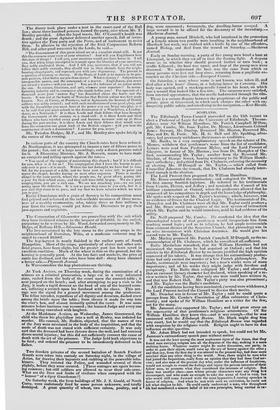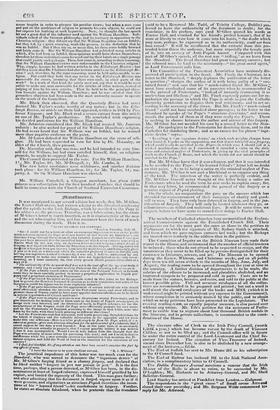SCOTLAND.
The Edinburgh Town-Council proceeded on the 15th instant to elect a Professor of Logic for the University of Edinburgh. The can- didates were Sir William Hamilton, Mr. Patrick Campbell M'Dou- gall, Mr. Combe, Mr. Isaac Taylor, 1)r. Memes, Lieutenant-Colonel James Stewart, Mr. Dunlop, Reverend Mr. Muston, Reverend Mr. Rae, and Dr. R. Poole. Mr. H. 0. Bell and Mr. Spalding, advo- cates, had previously withdrawn their names as candidates.
Mr. Banks, in a very complimentary speech on the talents of Dr. Memes, withdrew that gentleman's name from the list of candidates. Letters were read from Professor Mylne, and the Lord Provost of Glasgow, in favour of Mr. Muston ; one from Dr. Hampden of Ox- ford, recommending Mr. Taylor ; another from the Reverend Mr. Sinclair, of George Street, bearing testimony to Sir William Hamil- ton's orthodoxy;l and a third from Dr. Chalmers, enforcing the necessity of electing Mr. M'Dougall or Mr. Taylor,— which called from Councillor Johnston the remark, that Dr. Chalmers had already inter- fered enough in the election.
The Lord Provost then proposed Sir William Hamilton.
Mr. Bruce seconded the nomination ; and eulogized Sir William, as
the first among Scottish logicians. Ile referred to his testimonials from Cousin, Hervey, and Jeffrey ; and reminded the Council of his brilliant examination at Oxford, when the professors allowed that he surpassed all his competitors in depth and time knowledge of philosophy.
He spoke with respect of Mr. Taylor's learning; which, however, was no evidence of fitness for the Chair of Logic. The testimonials of Dr. Hampden and Dr. Chalmers were all that Mr. Taylor could produce; and Mr; Bruce could not approve of the new system of instruction which Mr. Taylor said he would introduce, until he had evidence of its utility.
Dr. Neill proposed Mr. Combe. He combated the idea that the phrenological tenets of that gentleman would incapacitate him from teaching sound logic; amid as to religion, lie had ample testimonials from eminent divines of the Secession Church, that phrenology was in no wise inconsistent with Christian doctrines. He would give his second vote to Mr. Taylor. Mr. Mackay proposed Mr. Patrick Campbell M'Dougall, on the re- commendation of Dr. Chalmers, which lie considered all-sufficient. Bailie Macfarlane remarked, that Sir William Hamilton had not
maintained the reputation he had acquired at Oxford ; and that his articles in the Edinburgh Review by no means justified the high opinion expressed of his talents. It was strange that his extraordinary produc- tions had only excited the wonder of a few French philosophers. No doubt, testimonials were important ; but a man's works were of more importance ; and of his works they might judge with freedom and perspicuity. The Bailie then eulogized Mr Taylor ; and observed, that an eminent literary character bad declared, when speaking of a re- view written by Mr. Taylor, that only one man could have written it, and that was Robert Hall. Mr. Taylor's piety was also preeminent; and Mr. Taylor was the Bailie's candidate.
All the candidates having been nominated, (several were withdrawn,) the Lord Provost invited the Council to discuss their merits.
Mr. Deuchar was in favour of Mr. Taylor ; said he could quote a passage"from Mr. Combe's Constitution of Man subversive of Chris- tianity; and spoke of Sir William Hamilton as a writer for the few, not for the many.
Mr. Jameson also supported Mr. Taylor; and laid great stress on the superiority of that gentleman's religious attainments. Of Sir
William Hamilton they knew this—and it was enough—that he was connected with the Edinburgh Review. Mr. Black might drag him into court, but he would say that the Edinburgh Review was regarded with suspicion by the religious world. Religion ought to have its due influence on this question.
Mr. Adam Black had not intended to speak, but could not let Mr. Jameson's extraordinary speech pass without notice.
It was not the least among the most unpleasant signs of the times, that they found men carrying religion into all the disputes of the day, making it a mere stalking-horse. Whatever matter might be under discussion, one party, in order to gain their object, would raise up the cry of heresy against the other ; and that cry, from the first day it was uttered to the present day, had done more mischief than any other thing in the world. Now, there might be men who had joined the Inquisition, really from an opinion that they had done God ser- vice • and also men of the present day who, under the influence of fanaticism, would not scruple to wound the feelings and injure the private interests of their fellow men, to promote what they considered the interests of religion. But there was another class—men whose private characters were any thing but circumspect, and who made no scruple to take the name of God in vain, but who would still come forward with the most hypocritic. 1 canting speeches in favour of religion. Arid when he met with such an exhibition, he could not tell what disgust he felt. He could easily understand a man, who throughout life had manifested a sincere belief of his own principles, being carried tom- Creme lengths in order to advance his peculiar views ; but when a man came and put on the semblance of religion to promote his own objects, he could not • but express his loathing at such hypocrisy. Now, he thought the last speech let out a great deal of the influence used against Sir William Hamilton. Indi- viduals talked of the German philosophy, and its tendency in opposition to the Christian religion : they did not say that Sir William I lamilton was an Infidel; but they led, by a quiet, creeping, snail-like process, to the deduction that he was an Infidel. But if they .ar so,or mean this, let them conic boldly forward and fairly state it. But Sir W illiam Hamilton had published many articles in which, if he had been an Infidel, these opinions would have shown themselves ; therefore let those individuals come forward and lay their hands on a single passage that could justify such a charge. Then, how came it, according to their reasoning, that Sir William Hamilton's views were unfavourable to the Christian religion ? Why, simply, because he had written articles in the Edinburgh Review—hut did they know that Dr. Chalmers had also written articles in the Edinburgh Re- view? and, therefore, by the same reasoning, must be held unfavourable to re- ligion. But could they hold that any writer in the Edinburgh Review was answerable for errors, assuming that there were such, in other parts of the work? In a wmk of that kind, he surely need not: say that it would be most unfair to make any man answerable for the articles of other writers, instead of judging of him by his own articles. That he held to be the principal (objec- tion brought against Sir William Hamilton ; and he was satisfied that this groundless objection had been made iu the most unworthy manner to operate on the minds of the Councillors.
Mr. Black then observed, that the Quarterly Review had never deemed Mr. Taylor's works worthy of any notice ; but in the Edin- burgh Revicar, an article on them had appeared, written in I8;14 by Pro- fessor .Empson; and Mr. Black read a severe extract from this article on one of Mr. Taylor's productions. He concluded with expressing his decided preference for Sir William Hamilton.
Mr. Johnston considered that Mr. Black had treated Alr. Jameson unfairly : he also wished for proof of Sir William Hamilton's religion. He had never heard that Sir William was an Infidel, but he wanted more than negative evidence on the point. Mr. M'Laren defended Sir William Hamilton on the score of reli- gion. He had been requested to vote for him by Dr. Macaulay, an elder of the Church, then present. Dr. 31acaulay said, that was true, and he had intended to vote him- self for Sir William, but had since satisfied himself, that, on religious grounds, he ought to support Mr. Taylor.
TheCouncil then proceeded to the vote. For Sir William Hamilton, 1 4.; Mr. Taylor, 10; Mr. M'Dougall, 5; Mr. Combe, 3.
The two latter candidates were withdrawn, and another division took place : for Sir William Hamilton, 18 ; for Mr. Taylor, 14 ; ma- jority, 4. So Sir William Hamilton was elected.



























 Previous page
Previous page